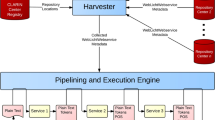Abstract
We describe and motivate the LAPPS Interchange Format, a JSON-LD format that is used for data transfer between language services in the Language Application Grid. The LAPPS Interchange Format enables syntactic and semantic interoperability of language services by providing a uniform syntax for common linguistic data and by using the Linked Data aspect of JSON-LD to refer to external definitions of linguistic categories. It is tightly integrated with the Web Services Exchange Vocabulary, which specifies a terminology for a core of linguistic objects and features exchanged by services.
Access this chapter
Tax calculation will be finalised at checkout
Purchases are for personal use only
Similar content being viewed by others
Notes
- 1.
The USE of LIF objects is actually not a strict requirement imposed for LAPPS Services. For example, services based on an existing pipeline of GATE components may choose to use the GATE format until the output of the very last component. We have created a suite of translation services that translate common linguistic objects between LIF and common existing formats.
- 2.
See http://www.json.org/ and http://json-ld.org/.
- 3.
- 4.
- 5.
A related issue is that versioning not only applies to the version of the wrapped NLP component, but also the version of the wrapper itself as well as to versions of definitions in the vocabulary. This issue is currently under discussion.
- 6.
- 7.
An alternative to this approach is to make PosTag a kind of annotation rather than a feature of an annotation, which can help in reducing potential redundancies that will become obvious later in this section. However, it was important to us to keep the number of annotation categories in the vocabulary as low as possible. We also felt that conceptually a part-of-speech tag is a natural feature of a token and not a standalone category.
References
Cunningham, H., Maynard, D., Bontcheva, K., Tablan, V.: GATE: a framework and graphical development environment for robust NLP tools and applications. In: Proceedings of the 40th Anniversary Meeting of the Association for Computational Linguistics (2002)
Ferrucci, D., Lally, A.: UIMA: an architectural approach to unstructured information processing in the corporate research environment. Nat. Lang. Eng. 10(3–4), 327–348 (2004). Cambridge University Press
Ide, N., Suderman, K.: The linguistic annotation framework: a standard for annotation interchange and merging. Lang. Resour. Eval. 48(3), 395–418 (2014)
Ide, N., Pustejovsky, J., Cieri, C., Nyberg, E., Wang, D., Suderman, K., Verhagen, M., Wright, J.: The language application grid. In: The Ninth Language Resources and Evaluation Conference (LREC 2014), Reykjavik, Iceland
Ide, N., Pustejovsky, J., Suderman, K., Verhagen, M.: The language application grid web service exchange vocabulary. In: Workshop on Open Infrastructures and Analysis Frameworks for HLT (OIAF4HLT), Held in Conjunction with COLING, Dublin, Ireland (2014)
Ishida, T. (ed.): The Language Grid: Service-Oriented Collective Intelligence for Language Resource Interoperability. Springer, Heidelberg (2011). ISBN: 978-3-642-21177-5. Observation of strains. Infect Dis Ther. 3(1), 35–43 (2011)
Phillips, A., Davis, M.: Tags for Identifying Languages. IETF Best Current Practice, September 2009. http://tools.ietf.org/html/bcp47
Acknowledgements
This work was supported by two National Science Foundation grants: NSF-ACI 1147944 and NSF-ACI 1147912.
Author information
Authors and Affiliations
Corresponding author
Editor information
Editors and Affiliations
Rights and permissions
Copyright information
© 2016 Springer International Publishing Switzerland
About this paper
Cite this paper
Verhagen, M. et al. (2016). The LAPPS Interchange Format. In: Murakami, Y., Lin, D. (eds) Worldwide Language Service Infrastructure. WLSI 2015. Lecture Notes in Computer Science(), vol 9442. Springer, Cham. https://doi.org/10.1007/978-3-319-31468-6_3
Download citation
DOI: https://doi.org/10.1007/978-3-319-31468-6_3
Published:
Publisher Name: Springer, Cham
Print ISBN: 978-3-319-31467-9
Online ISBN: 978-3-319-31468-6
eBook Packages: Computer ScienceComputer Science (R0)



